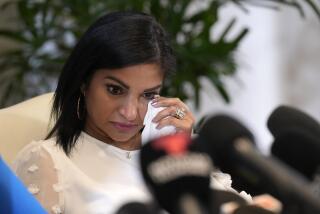In this paper, heroes are MIA
DURING THE last two weeks, the Los Angeles Times has printed at least four front-page articles, and several others on inside pages, about a Marine squad accused of killing 24 Iraqi civilians in Haditha and possibly falsifying reports about the incident. Some of the information reported by The Times was based on the military’s own investigation. The Times’ reports seemed fair, stressing the conditions of combat and confusion faced by our troops.
As the father of a Marine who served two combat tours in Afghanistan and participated in missions in Iraq, I’m glad the newspaper reports military failures. I want the military to be better too. I’m also grateful for the many poignant stories about our troops that Times’ reporters such as Tony Perry and David Zucchino have written for the paper.
However, if the “chattering classes” ever wonder why those of us in the military family sometimes bitterly resent the media, they need look no further than the “Haditha story.” What bothers me is that I haven’t seen one recent story dedicated to the heroism of our troops given such consistent prominence in The Times or other leading papers. Nor have I read a front-page headline about a military medal ceremony and the story behind it, although every year I see front-page treatment in The Times of who wins the Oscars.
Apparently some awards are more equal than others -- say, for being a supporting actress in a forgettable movie rather than risking one’s life to save a group of Iraqi children.
If there is such a thing as “anti-military media bias,” it is not in how stories are reported. It is in what stories are ignored and the editorial “values” implicit in those daily choices.
Who decided that dramatic acts of military heroism no longer merit front-page treatment? During World War II, the Korean War and even the early years of the Vietnam War, such stories got Page 1 attention. Where are today’s front-page headlines that read “Marine Dies Saving His Squad” to balance “Marines Accused of Massacre”?
The prominence of stories about military malfeasance, absent stories about military heroism, creates an out-of-whack impression. When it comes to reporting on the military, it’s as if we’re back in the 1950s, only this time the media prejudice and insensitivity are aimed at military service rather than race. In the 1950s, you rarely saw a story about an African American unless he or she committed a crime or was portrayed with condescension as a victim.
What I would like to see is acts of military heroism regarded once again as newsworthy. Here is one story that would have merited a front-page headline if the editorial values of this paper were less dismissive of military valor.
Staff Sgt. Anthony L. Viggiani is one of the recently distinguished heroes of the Marine Corps. On Feb. 24, he was awarded the Navy Cross for his actions in Afghanistan in June 2004. Viggiani had been fighting Taliban remnants who were killing teachers and burning girls’ schools. He led his men in combat after being wounded. He chased down and killed or captured the enemy. He humanely tended to the wounded enemy fighters he had been fighting moments before. He led his men to safety and honor. Was a Times reporter sent to cover the medal ceremony and to report on what lay behind it? If not, why not? Whose values dictate that winning a Navy Cross is less important than a Pulitzer, an Oscar or a PEN award?
I have no problem with reporting on the military’s occasional failures. But it’s unfair and out of context when, at the same time, editors at our best papers ignore much more routine acts of individual heroism that balance this grim picture. The Times should help us be as proud of our heroes as we are disappointed by those very few who dishonor us.
More to Read
Sign up for Essential California
The most important California stories and recommendations in your inbox every morning.
You may occasionally receive promotional content from the Los Angeles Times.










